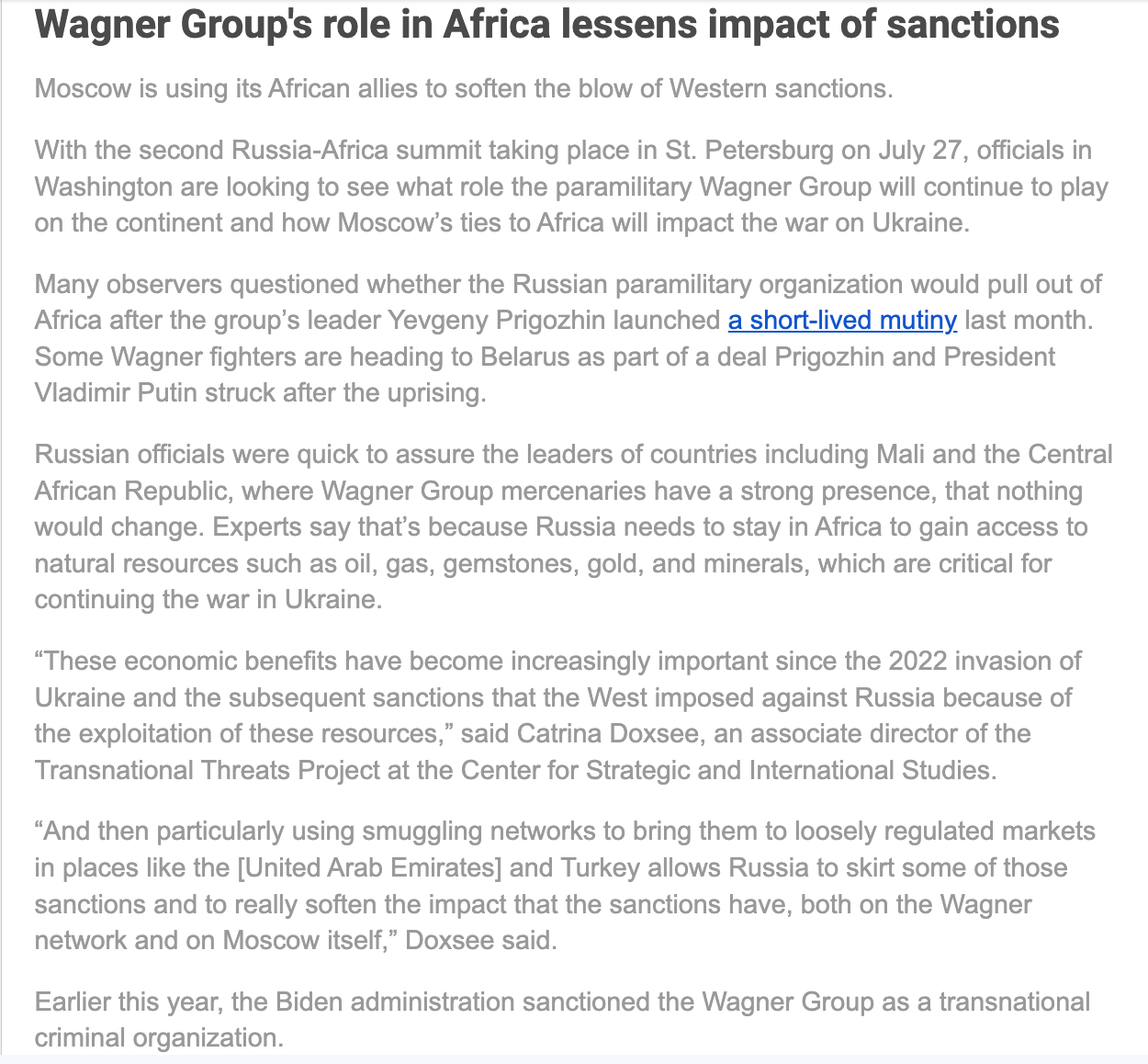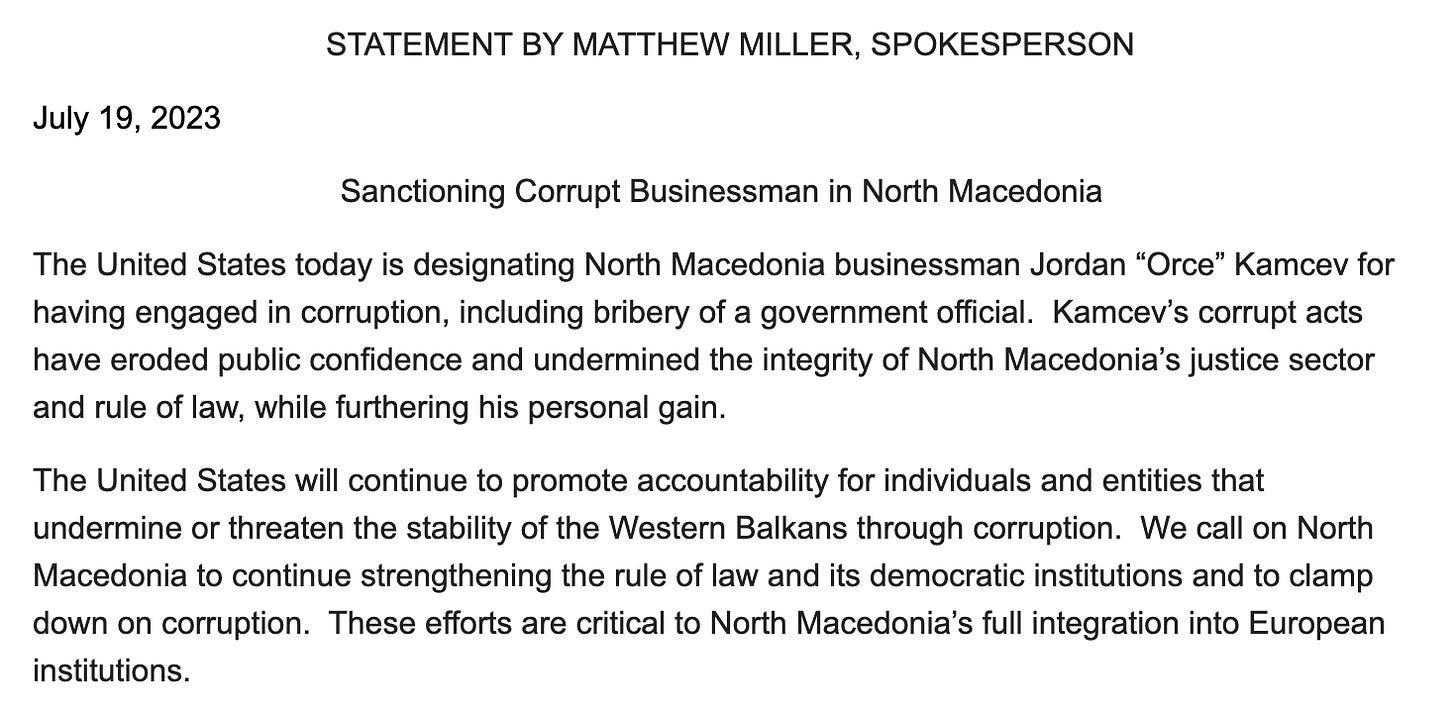I spent most of the week chasing people around Washington D.C., asking questions and conducting interviews. It’s that busy period before Congress leaves for the August recess when lawmakers try to get everything across the finish line. The Senate is expected to vote next week on the National Defense Authorization Act, its annual defense policy bill that includes everything but the kitchen sink.
Lawmakers from the House and the Senate must come together in the autumn to hash out a compromise bill that can pass both chambers. No one expects that to be easy. The House version of the bill contains some controversial amendments that the Senate will not back.
There are also some rumblings about the Senate potentially staying put for part of August to advance defense and diplomatic nominations that have been held up over partisan politicking. But let’s hope that doesn’t happen because this reporter plans to write from the road in New England in August.
Aside from that, the speaker of Moldova’s parliament was recently in town to push for the creation of a Moldova Senate Caucus, among other things. I spoke to Congressman Ami Bera about his recent trip to Southeast Asia and why he’s pushing for legislation to help Cambodia, Laos, and Vietnam clear landmines, and I met with an exiled Russian opposition leader who has plans for a post-Putin Russia (more on all those stories soon).
Israeli President Isaac Herzog was also in town, just as massive protests broke out in Israel against Prime Minister Benjamin Netanyahu’s decision to advance controversial judicial reform.
Here’s a sneaky photo I took of Herzog walking the halls of Congress with House Speaker Kevin McCarthy. My story on Herzog’s visit is here.
Italy’s Prime Minister Giorgia Meloni is coming to town next week.
Meanwhile, Russia abandoned the Black Sea grain deal that kept global food prices reasonably stable throughout months of war. Some believe that’s because Turkey, which helped broker the deal, made a sudden but probably performative shift to the West leading up to the NATO summit in Vilnius. Others say it’s in response to Ukrainian drone attacks on the Crimean Peninsula. Whatever the reason, it’s expected to make food prices across much of the global south skyrocket. Next week, Russia is hosting in St. Petersburg the second Russia-Africa summit since the start of the war. I wonder what African leaders will have to say about this latest development.
My eyes are on the election in Spain today, which has been called one of the most consequential since the country’s transition to democracy after the death of fascist dictator Francisco Franco in the 1970s. There’s a good chance the far-right could end up in a governing coalition if the center-right People’s Party wins.
I received my ballot to vote by mail one day past the deadline, which is infuriating. I know this happened to other Spanish expats, too, and I can’t help but wonder how these roadblocks to democratic participation will impact the outcome of today’s election.
That’s all for now. I hope you’re all having a wonderful weekend, wherever you roam.
What I’m writing:
• Israeli President Isaac Herzog’s arrival in Washington this week laid bare a divide in the Democratic Party, as progressive Democrats boycotted his address to Congress and others threw their weight behind the U.S.-Israel relationship. It might have been a tricky time for the visit. Israeli politics are reaching a crescendo as Prime Minister Benjamin Netanyahu advances judicial reforms that have led to widespread demonstrations in Israel and as tensions heat up in the West Bank. This story is unlocked and free to read.
My weekly news blurbs:
What I’m reading:
I don’t make jokes. I just watch the government and report the facts – American vaudeville performer Will Rogers
• Atesh, a Crimean Tatar-led guerrilla group, is active behind Russian lines, the Guardian reports. Hundreds of young Tatar men are ready to take up arms to liberate the occupied Crimean peninsula, Mustafa Dzemilev, a leader of the Crimean Tatar rights movement, said. Atesh also claims that more than 4,000 Russian soldiers enrolled in an online course on “surviving the war” by wrecking their own equipment.
• Yevgeny Prigozhin, chief of the paramilitary organization Wagner group, said Wagner would not fight in Ukraine and repeated his criticism that Russia’s invasion of Ukraine has failed, in what appeared to be his first video appearance since the armed action, the Washington Post reports.
• Paramilitary organization Wagner group troops will help train Belarusian special forces during exercises at a military range near the border with Poland, Reuters reports. Poland’s military will move troops to the east due to the Wagner group’s presence in Belarus.
• Russian President Vladimir Putin said Moscow would react to any aggression against Belarus “with all means at our disposal” after Poland bolsters its eastern border, Al Jazeera reports.
• A Moscow court on July 21 sanctioned the arrest of Igor Girkin, a Russian war criminal and former commander of Russian proxy forces in Ukraine, after Girkin's harsh criticism of Vladimir Putin for not doing enough to win the war against Ukraine, the Kyiv Independent reports.
• The White House warned that the Kremlin mined sea routes in the Black Sea and might be planning a false-flag attack on commercial transport ships, the New York Times reports.
• Azerbaijan has barred the International Committee of the Red Cross from using the only road connecting Nagorno-Karabakh to Armenia and the outside world, EurasiaNet reports.
• Armenia Prime Minister Nikol Pashinian said a new war with Azerbaijan remains a high probability in the absence of a peace treaty between the two countries, Radio Free Europe reports.
• The cozy relations between Spain’s Popular Party leader Alberto Núñez Feijóo and a notorious drug trafficker burst into the country’s election contest, threatening to dampen the opposition leader’s campaign, Politico Europe reports.
• A controversial Illegal Migration Bill – which will allow the United Kingdom to detain and remove anyone entering the country illegally – is set to become law after the government won a final series of votes in the House of Lords, the BBC reports. Officials from the United Nations released an unusually critical joint statement, claiming the bill breaks the U.K.’s obligations under international law.
• The Israeli Defense Forces threatened to arrest reservists who pledged not to report for duty as part of protests at the government’s planned judicial overhaul, Reuters reports.
• China is seeking access to Afghanistan’s lithium and other mineral deposits that might be worth $1 trillion, the Washington Post reports.
• China’s enthusiastic reception of Henry Kissinger, the 100-year-old former secretary of state, demonstrates Beijing’s effort to reach outside official diplomatic channels to influence Washington’s thinking, the New York Times reports. Kissinger met with the Chinese defense minister, even as he rebuffed multiple requests to engage with his U.S. counterpart.
• Cambodia’s Prime Minister Hun Sen is ramping up the pressure on the country’s beleaguered opposition forces as the country moves to a national election on Sunday, despite the near-total lack of opposition to his ruling Cambodian People’s Party, Sebastian Strangio writes for the Diplomat.
• Cambodia's Hun Sen, one of the world's longest-ruling leaders, has indicated his eldest son and anointed successor Hun Manet might take over as soon as next month in a surprise revelation just days out from a one-sided election, Reuters reports.
• The United Nations described the two conditions set by the Syrian government for allowing aid to reach rebel-held territory as “unacceptable,” the BBC reports.
Interesting statements:
You can write to me for any reason: c.maza@protonmail.com.










